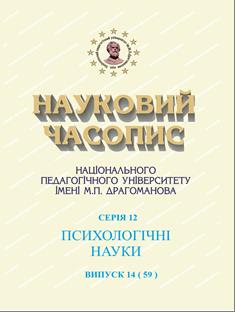INFLUENCE OF THE FAMILY ON OCCURRENCE OF PSYCHOSOMATIC DISORDERS IN PRIMARY SCHOOL CHILDREN
DOI:
https://doi.org/10.31392/NPU-nc.series12.2021.14(59).10Keywords:
psychosomatic disorders, primary school-aged children, style of family upbringing, psychological climate in the family, anxiety, stressful situationsAbstract
The article emphasizes the importance of the problem of psychosomatic disorder growth in primary school-aged children. Medical sphere professionals are frequently confronted in their practice with the children, whose pathology puts them “in a dead end” as for the ways of dealing with it as it does not come with some visible changes in the somatic status. These are not manifested even in an in-depth study, although accompanied by the changes in the child’s psychological state. The impact of the family on the occurrence of psychosomatic disorders in children requires special attention to be studied while regardless of the family’s well-being and general economic situation in the family, even with the favorable factors of child development, unconstructive style of family upbringing can trigger psychosomatic disorders. The psyche of the primary school-aged child is characterized with particular vulnerability and children’s insufficient ability to think critically about the world that surrounds them. As a family member, the child gets into relationships with their parents who can have both positive and negative effect on them. Thus, harmonious relationships in the family, namely those of children with their parents, appear to be an essential condition for the mental development of a primary school-aged kid. Parents give children the sense of security, help them learn how to behave and respond to certain conditions in life. The results of the empirical study made it possible to identify the details of a family’s influence on the occurrence of psychosomatic disorders in primary school-aged children. Moreover, they helped the authors figure out the level of parent’s awareness of the tasks, content and methods of raising children; identify the peculiarities of parents’ attitude, and determine the degree of children’s satisfaction with their position in the family.
References
- Aleksander, F. (2006). Psihosomaticheskaya medicina. Principy i primenenie [Psychosomatic medicine. Principles and Applications.]. Moscow: Institut Obshhegumanitarnyh Issledovanij [in Russian].
- Aleksandrov, Yu.A. (1993). Pohranychnye psykhycheskye rasstroistva: rukovodstvo dlia vrachei [Borderline Mental Disorders: A Guide for Physicians]. Moscow : Medytsyna [in Russian].
- Antropov, Yu.F. (2001). Psykhosomatycheskye rasstroistva: kurs lektsyi. [Psychosomatic disorders: a course of lectures.]. Moscow : Yzd-vo Ynstytuta Psykhoterapyy [in Russian].
- Bazhurin, V.B., Fedorova, G.M., & dr. (2010). Osnovy psihosomatiki [Basics of psychosomatics]. Doneck : Institut Kul’tury DonNTU [in Ukrainian].
- Bileckaya, M.P. (2010). Semejnaya psihoterapiya detej s psihosomaticheskimi rasstrojstvami (ZHKT) [Family psychotherapy for children with psychosomatic disorders (GIT)]. Saint Petersburg : Rech’ [in Russian].
- Brojtigam, V., Kristian, P., & Rad, fon M. (1999). Psihosomaticheskaya medicina [Psychosomatic medicine]. Moscow : Geotar Medicina [in Russian].
- Varga, A.Yа., & Drabkina, T.S. (2001). Sistemnaya semejnaya psihoterapiya: kratk. lekcionnyj kurs [Systemic family psychotherapy: brief. lecture course]. Saint Petersburg : Rech’ [in Russian].
- Eremina, N.YU. (2015). Psihosomaticheskie rasstrojstva u detej v sem’yah s razlichnymi stilyami semejnogo vospitaniya [Psychosomatic disorders in children in families with different styles of family education]. Povolzhskij pedagogicheskij vestnik – Volga Pedagogical Bulletin, 4(9), 121–126. Retrieved from https://cyberleninka.ru/article/n/psihosomaticheskie-rasstroystva-u-detey-v-semyah-s-razlichnymi-stilyami-semeynogo-vospitaniya [in Russian].
- Isaev, D.N. (1996). Psihosomaticheskaya medicina detskogo vozrasta [Psychosomatic medicine for children]. Saint Petersburg : Rech’ [in Russian].
- Krejsler, L. (1994). Psihosomatika v psihopatologii mladenchestva [Psychosomatics in the psychopathology of infancy]. Mat’, ditya, klinicist: Sbornik – Mother, Child, Clinician: A Compilation, 112–145 [in Russian].
- Miniyarov, V.M. (2006). Pedagogicheskaya psihologiya. Сhast’ І. Psihologiya vospitaniya [Pedagogical psychology, Part I. Parenting psychology]. Samara : Sam GPU [in Russian].
- Mozgova, G.P., Khanetska, T.І., & Yakymchuk, O.І. (2021). Psihosomatika: psihіchne, tіlesne, socіal’ Hrestomatіya: Navchalnyy posibnyk. [Psychosomatics: psycho, solid, social. Reader: Textbook]. Kyiv : NPU іmenі M.P. Dragomanova [in Ukrainian].
- Petryuk, P.T., & Yakushchenko, I.A. (2003). Psihosomaticheskie rasstrojstva: voprosy definicii i klassifikacii [Psychosomatic disorders: questions of definition and classification]. Vestnik Associacii psihiatrov Ukrainy – Bulletin of the Association of Psychiatrists of Ukraine, 3–4, 133–140. Retrieved from http://www.psychiatry.org.ua/articles/paper144.htm [in Ukrainian].
- Sandomirskij, M.E. (2007). Psihosomatika i telesnaya psihoterapiya: prakt. rukovodstvo [Psychosomatics and body psychotherapy: practical. leadership]. Moscow : Klass [in Russian].
- Sel’e, G. (1992). Kogda stress ne prinosit gorya [When stress doesn’t bring grief]. Moscow : MNPP “RENAR” [in Russian].
- Starshenbaum, G.V. (2014). Psihosomatika: rukovodstvo po diagnostike i samopomoshchi [Psychosomatics: a guide to diagnosis and self-help]. Rostov-on-Don : Feniks [in Russian].
- Shnejder, L.B. (2000). Psihologiya semejnyh otnoshenij. Kurs lekcij [Psychology of family relations. A course of lectures]. Moscow : Aprel’-Press; EKSMO-Press. Retrieved from http://psychlib.ru/mgppu/SPs/SPs-01.HTM [in Russian].
- Ejdemiller, E.G., Dobryakov, I.V., & Nikolskaya, I.M. (2003). Semejnyj diagnoz i semejnaya psihoterapiya [Family diagnosis and family psychotherapy]. Saint Petersburg : Rech’ [in Russian].
- Ejdemiller, E.G., & YUstickis, V.V. (2008). Psihologiya i psihoterapiya sem’i [Family psychology and psychotherapy]. Saint Petersburg : Piter [in Russian].
- Beketova, G., Mozgova, G., Shekera, O., Beketova, N., & Liubava-Stephania (2019). Neurophysiological characteriscs of psychosomatic disorders and psychosomatic pathology in children and adolescents. Wiadomości Lekarskie is abstracted and indexed. Tom LXXII, 12(I), 2282–2288. Retrieved from https://wiadlek.pl/wp-content/uploads/2020/02/WL-12-cz-I-2019.pdf
- Dunbar, F. (1935). Emotions and bodily changes. American Journal of Psychiatry, 93(3), 749.
- Dunbar, F. (1943). Psychosomatic diagnosis. New York-London : PB Hoeber.

